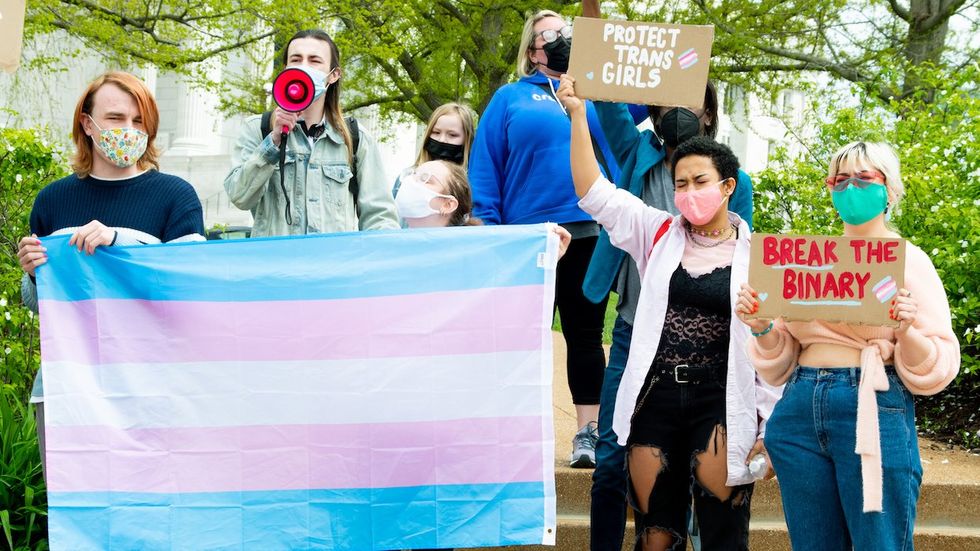Bans on gender-affirming care for transgender youth will go into effect in Texas and Missouri despite court challenges to them.
A state-level court in Texas issued an injunction Friday blocking enforcement of its ban, but the Texas attorney general's office quickly filed an appeal, and under Texas law, its filing of an appeal automatically lifts the injunction.
Families, health care providers, and LGBTQ+ organizations filed suit in July to block Senate Bill 14 before the legislation goes into effect September 1. Gov. Greg Abbott signed SB 14 into law in June, making it the most populous state to enact such a measure. But with Paxton’s action, it will take effect as scheduled.
In Missouri, St. Louis Circuit Judge Steven Ohmer declined to issue an injunction in a lawsuit brought by families, health care professionals, and LGBTQ+ groups. Gov. Mike Parson signed that state’s ban, Senate Bill 49, June 7. Ohmer’s decision means it will go into effect Monday as planned.
The Texas law bans surgery, hormone treatment, and puberty blockers for the purpose of gender transition for people under 18, while allowing those procedures for treatment of congenital anomalies, early-onset puberty, and other conditions. It includes an exception for young people who began treatment before June 1 but says doctors must wean them off any prescription drugs they’re taking for transition. There is also an exception for those who have had at least 12 sessions of counseling over six months. Doctors, however, may be reluctant to offer these treatments for fear of violating the law.
The plaintiffs say the law violates the Texas constitution because it bans the procedures for treatment of gender dysphoria but allows them for other reasons. They further say that young transgender Texans and their families will suffer irreparable harm under the statute.
Judge Maria Cantú Hexsel agreed after hearing testimony in the case August 15 and 16. “There is a substantial likelihood” that they will prevail in a trial, Cantú Hexsel, a judge in the 53rd Judicial District Court in Travis County, wrote in her ruling. She also agreed that there will probably be “irreparable injury” to the young people and their families if the law is allowed to be enforced — but now Paxton's appeal means it will be enforced while the suit proceeds. Cantú Hexsel scheduled the trial for May 6.
The plaintiffs include five Texas families, three medical professionals, and two organizations, PFLAG National and GLMA: Health Professionals Advancing LGBTQ+ Equality. They are represented by lawyers from Lambda Legal, the American Civil Liberties Union and its Texas affiliate, the Transgender Law Center, and the firms of Scott Douglass & McConnico LLP and Arnold & Porter Kaye Scholer LLP.
The Missouri law prohibits hormone treatment, puberty blockers, and gender-confirmation surgeries for the purpose of gender transition for people under 18, while allowing them for cisgender minors who have a disorder of gender development or other condition that necessitates their use. Trans minors already on hormones or puberty blockers will be able to stay on them, but they cannot initiate treatment. The law also bans gender-affirming care for adults imprisoned in Missouri and prevents the state’s Medicaid program from covering this care for people of any age.
The suit against it was brought by the families of three transgender people, Southampton Community Healthcare and two of its medical providers, and also PFLAG and GLMA. They are represented by Lambda Legal, the American Civil Liberties Union of Missouri, and Bryan Cave Leighton Paisner LLP. As in Texas, they argue that the ban violates the state constitution’s guarantee of equal protection of the laws, interferes with parents’ rights to control their children’s health care, and will cause irreparable harm to the people affected by it.
Ohmer held a hearing on evidence in the case this week, and Friday he released an order saying he would not issue the injunction. He wrote that the plaintiffs “have not clearly shown a sufficient threat of irreparable injury absent injunctive relief” and that there was no “clear public interest” in favor of the injunction.
“The science and medical evidence is conflicting and unclear,” Ohmer added. “Accordingly, the evidence raises more questions than answers.”














































































